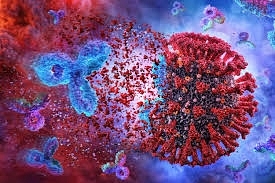Insta
US Pharma Giant Eli Lilly Initiates Phase 3 Trial of Its Experimental Antibody Drug LY-CoV555 for Prevention of COVID-19

European Pharma Association
US pharmaceutical giant Eli Lilly on Monday (Aug 4) announced that it has commenced Phase 3 trial of its experimental antibody drug LY-CoV555 for the prevention of SARS-CoV-2 infection and COVID-19 in residents and staff at long-term care facilities in the U.S.
Antibodies are typically proteins the body produces in response to invasion of a foreign substance such as a virus. They can be obtained from the blood of recovered patients or created in the laboratory from genetic sequences.
LY-CoV555, the lead antibody developed by Lilly in collaboration with AbCellera, is positioned as a neutralizing antibody against SARS-CoV-2, the virus that causes COVID-19. It is being developed to serve as a potent, neutralizing IgG1 monoclonal antibody (mAb) directed against the spike protein of SARS-CoV-2.
LY-CoV555 is designed to work by blocking viral attachment and entry into human cells, thus neutralizing the virus, potentially preventing and treating COVID-19. It was identified from a blood sample taken from one of the first U.S. patients who recovered from COVID-19.
Lilly's Phase 3 trial is being conducted in partnership with NIAID, part of the National Institutes of Health (NIH), along with the COVID-19 Prevention Network (CoVPN) and several long-term care facility networks across the country. The study will enroll residents and staff who live or work at facilities that have had a recently diagnosed case of COVID-19 and who are now at a high risk of exposure.
It will evaluate the efficacy and safety of LY-CoV555 for the prevention of SARS-CoV-2 infection and COVID-19, testing whether a single dose of LY-CoV555 reduces the rate of SARS-CoV-2 infection through 4 weeks, as well as complications of COVID-19 through 8 weeks. It is expected to enroll up to 2,400 participants.
The rapid spread of SARS-CoV-2 among residents of long-term care facilities combined with the higher mortality rate for the elderly creates the urgent need for therapies to prevent COVID-19 in this vulnerable population.
Support Swarajya's 50 Ground Reports Project & Sponsor A Story
Every general election Swarajya does a 50 ground reports project.
Aimed only at serious readers and those who appreciate the nuances of political undercurrents, the project provides a sense of India's electoral landscape. As you know, these reports are produced after considerable investment of travel, time and effort on the ground.
This time too we've kicked off the project in style and have covered over 30 constituencies already. If you're someone who appreciates such work and have enjoyed our coverage please consider sponsoring a ground report for just Rs 2999 to Rs 19,999 - it goes a long way in helping us produce more quality reportage.
You can also back this project by becoming a subscriber for as little as Rs 999 - so do click on this links and choose a plan that suits you and back us.
Click below to contribute.
Latest